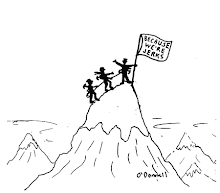"(does Smearcase enjoy social work?… being a social worker?… hard to tell, at times)"
This from a gracious link coupled with a gentle critique yonder at
Asocial Work.
I'm afraid this is going to prompt more me-blogging for the moment, but I can't resist the question, once asked.
It seems to me I may have had some idiosyncratic reasons for going into Social Work. I mean, it wasn't wholly divorced from the vague "tikkun olam"* impulse that drives a bunch of other people in, which by itself is a roller-coaster to burnout, but without which, why would you bother?
Well wait. Why
do people go into social work? If I were to generalize from people I knew in grad school, I'd say "because they have an undergraduate degree in psychology and are 21 and aren't brimming with good ideas." If I were to turn an equally awful eye on the people I've met since graduating, I might say "because they really like kids and think that's enough."
Whatever my other mistakes, I was creeping up on 30 when I applied to my MSW program and, though I was on my way out of a PhD program I was hopeless at, and needed something new PDQ, I had put a reasonable amount of thought into the whole question. I had sort of jumped the fence because of the 2000 election from "vaguely lefty because Mom & Dad are democrats" to "passionately though still often ill-informedly lefty" and I think this had something to do with it as well.
Mostly, though, I had had some jobs and met some other people with other jobs and decided that the main thing I wanted was a job that didn't make the world any worse, but also didn't make me want to run screaming into the sea. (I was in Chicago at the time. Long run.) And here is where I made the world's most laughably naive mistake, which I will confess for your Schadenfreudian delectation.
Boiling this down to the form in which it makes me look most idiotic (as the card in
Slacker says: take the most embarrassing detail and amplify it) I became a social worker because I didn't want to do paperwork.
How this bit of epistemological slapstick occured is that I dreamed of jobs where the substantial part of your work was also the valued part, where you didn't have to corporately market the spending of your minutes, and the job that most matched up in my head with this was psychotherapist. This had to do with going to therapists and not knowing what bullshit they had to do later to get paid by the insurance company, and by watching for instance
The Sopranos where they never show Dr. Melfi screaming "THERE WAS NO OBSERVABLE BEHAVIORAL GOAL THIS SESSION IT IS FUCKING THERAPY NOT PUTTING TOGETHER A FUCKING IKEA TABLE" as she writes a progress note full of colorful Italian-American expressions and unrecognizable Sicilian pronunciations of lunch meats.
But for real. I thought: therapy is a job where you don't have to meet some standardized metric. You listen, you talk, you proffer Kleenex, and the session ends. Self-contained, non-commodified, perhaps non-commodifiable helpfulness. At worst, not that helpful. At best, fairly helpful!
And then the last eight years happened and I realized that if you get really lucky, you get a job where you do a little good instead of being a full-time bureaucrat with a quaint little hobby of talking to people when not tending to the papers. Granted, this is the low end, the "trenches" as we sometimes say. Higher up it may be different but I haven't smelled the air up there.
I mean therapy and casework
can be really helpful, but you have to fight for it to be, and I have never relished fighting for what should be given. So I have not enjoyed a lot of it. I feel good about what I do, which I'm sometimes nervous just means I enjoy having some built in moral superiority, but it has been only intermittently satisfying.
Do I enjoy it? Eh, define "enjoy." As work goes, it seems relatively non-soul-crushing. I enjoy my coworkers. I enjoy the good cases I get here during the interview and some of the writing process when I'm in good voice so to speak, but not the collateral interviews with overly concrete parents, not the phone tag with programs, not the primitive ritual you participate in to get records. I enjoy getting my perfectly ok paycheck. I enjoy it as much as one can expect to enjoy a job, I think? I'm not sure it means much whether I enjoy it. I get more or less what I expect out of it.
There is once in a while the tingling sensation in the top of the head to be had from the feeling of having done something well. "I really helped him with behavioral interventions for anxiety" sez Me The Imaginary Therapist or "I really got what his story is about in a way the D.A. would have to be an Ayn-Rand-reading reptile not to be moved by" sez Actual Me. It's infrequent. When I find something likely to produce it more often, maybe I'll jump on it.
So that's the direct statement of my unsurprisingly discursive answer. Whether that makes the navelly directed gazing of the other entries more digestible, I do not know.
*Hebrew for "to heal the world." Why I feel compelled to include it in this form is anyone's guess. My lovely gentleman companion recently noted that Jews blame our worst characteristics on Judaism which--just between you, me, and my overly assertive Ashkenazic eyebrows--may be true. The thing is, we also ascribe all our best to it.
